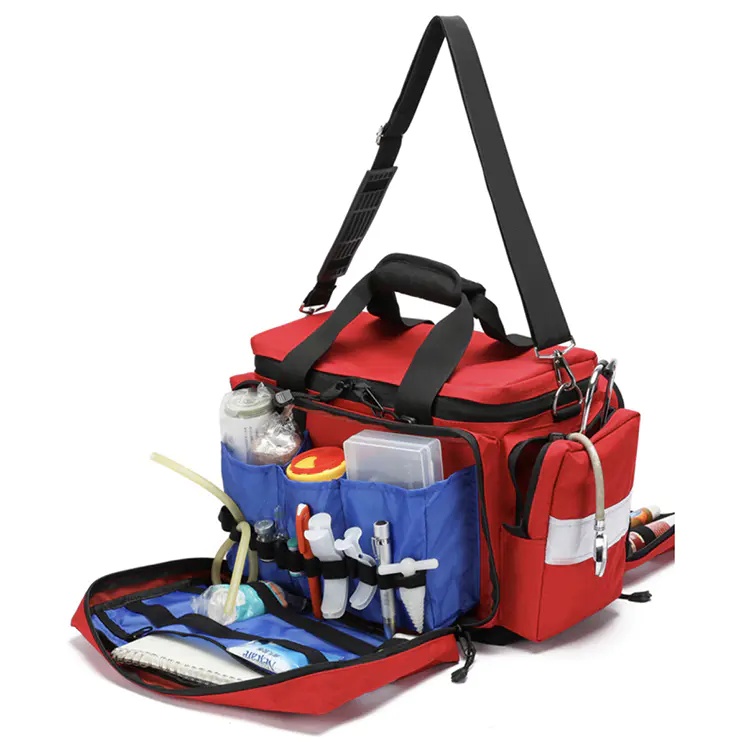Emergencies are unpredictable, and having the right preparedness tools can make the difference between safety and vulnerability. A Trauma First Aid Kit is designed to handle critical injuries, but not every situation calls for the same size or level of equipment. Choosing between a compact kit and a large kit depends on your lifestyle, environment, and level of risk. This guide explores the strengths of both options to help you decide which one best fits your needs.
When it comes to first aid, the size of the kit is more than just convenience. It impacts:
Portability – Can you carry it easily in daily activities or travel?
Capacity – Does it hold enough supplies for single or multiple casualties?
Functionality – Are the items organized for quick access during high-stress moments?
Adaptability – Will it serve you in different environments, from remote outdoor trips to busy workplaces?
The reality is that emergencies rarely give warnings. A compact kit provides speed and mobility, while a larger kit offers comprehensive coverage. Understanding these differences ensures you are not underprepared or burdened by unnecessary bulk.
Compact kits are designed with mobility in mind. They are small enough to fit in backpacks, glove compartments, or workplace drawers, making them an excellent choice for individuals and small groups. These kits typically contain the most essential supplies for handling bleeding, minor fractures, or basic wound care.
Lightweight and easy to carry anywhere.
Ideal for hiking, travel, cycling, or personal vehicles.
Provides quick access to essential lifesaving tools.
Simplifies decision-making in urgent moments.
Often built with durable, weather-resistant cases to withstand outdoor use.
While compact kits are reliable for immediate intervention, they may have limited supply options. For example, treating multiple people or managing extended emergencies may quickly deplete resources. They are best suited for treating one or two people until professional help arrives.

Large kits are built for comprehensive coverage in environments where multiple casualties are possible. These kits are commonly used in schools, offices, construction sites, or community preparedness programs. They often include a broader range of supplies to treat bleeding, fractures, burns, and more severe injuries.
Contains a wider range of emergency tools and supplies.
Suitable for group settings and extended care before medical help arrives.
Organized compartments for managing serious injuries more effectively.
Long-term readiness with more versatile treatment options.
Offers peace of mind for leaders responsible for group safety.
The trade-off is that large kits are heavier and less portable, making them more suitable for stationary storage rather than constant carrying. They require more space and may not always be practical for solo travelers.
Here's a simplified view of how compact and large trauma kits differ:
| Feature | Compact Trauma Kit | Large Trauma Kit |
|---|---|---|
| Portability | Easy to carry, lightweight | Bulky, less portable |
| Best Use | Personal, travel, outdoor | Workplaces, schools, large groups |
| Capacity | Limited supplies, quick fixes | Extensive supplies for multiple people |
| Storage | Fits in cars, backpacks | Stored in offices, homes, facilities |
| Emergency Response | Immediate, short-term care | Broader, extended care options |
| Flexibility | Quick mobility | Comprehensive readiness |
The choice depends on who you are preparing for and where you expect to need it.
If you're an individual adventurer, traveler, or driver, a compact kit ensures that essential care is always within reach. Its small size makes it less intrusive, yet still powerful enough for immediate lifesaving needs.
If you manage a family, workplace, or group activity, a large kit offers the depth and range needed to protect more people. Having a large kit available can reduce panic and provide clear structure when multiple injuries occur.
Many households and organizations benefit from keeping both sizes available—a compact kit for portability and a large one for comprehensive backup. This layered approach ensures preparedness across different scenarios.
Regardless of the size, your kit should be:
Checked regularly to replace expired items.
Organized clearly for quick access.
Stored safely in an accessible but secure location.
Adjusted seasonally if used outdoors (e.g., adding cold-weather gear or burn supplies).
A well-maintained kit ensures you're never caught off guard when emergencies strike. Neglecting maintenance can turn even the most advanced kit into a liability.
Choosing a durable, well-constructed kit is just as important as choosing the right size. Look for kits with impact-resistant cases, water-resistant materials, and clearly labeled compartments. These design details save precious time and reduce confusion when every second counts.
It's also wise to select a manufacturer with consistent quality control and a strong focus on practical design. After all, a trauma kit is only as effective as its reliability under stress.
For individuals, families, and businesses seeking trustworthy emergency preparedness products, yonoel stands out as a dependable manufacturer. With a focus on quality design and practical functionality, yonoel produces kits that balance durability, accessibility, and comprehensive care. Every kit is created with real-world needs in mind, making them reliable in both personal and professional settings.
Whether you need compact kits for travel or large kits for organizations, yonoel offers tailored solutions that deliver peace of mind. By combining thoughtful craftsmanship with strict quality standards, yonoel ensures every customer receives a kit that truly supports safety and readiness.
Discover more about emergency readiness and explore the full product range at yonoel, where safety and reliability come first.